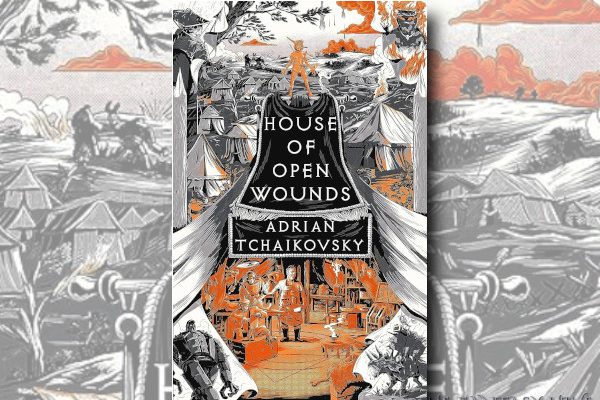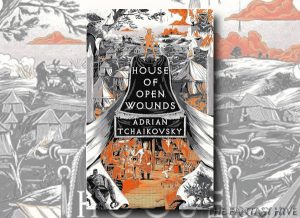HOUSE OF OPEN WOUNDS by Adrian Tchaikovsky (BOOK REVIEW)

City-by-city, kingdom-by-kingdom, the Palleseen have sworn to bring Perfection and Correctness to an imperfect world. As their legions scour the world of superstition with the bright flame of reason, so they deliver a mountain of ragged, holed and scorched flesh to the field hospital tents just behind the frontline.
Which is where Yasnic, one-time priest, healer and rebel, finds himself. Reprieved from the gallows and sent to war clutching a box of orphan Gods, he has been sequestered to a particularity unorthodox medical unit.
Led by ‘the Butcher’, an ogre of a man who’s a dab hand with a bone-saw and an alchemical tincture, the unit’s motley crew of conscripts, healers and orderlies are no strangers to the horrors of war. Theirs is an unspeakable trade: elbow-deep in gore they have a first-hand view of the suffering caused by flesh-rending monsters, arcane magical weaponry and embittered enemy soldiers.
Entrusted – for now – with saving lives deemed otherwise un-saveable, the field hospital’s crew face a precarious existence. Their work with unapproved magic, necromancy, demonology and Yansic’s thoroughly illicit Gods could lead to the unit being disbanded, arrested or worse.
Beset by enemies within and without, the last thing anyone needs is a miracle.
 I first knew of Adrian Tchaikovsky’s writing through having heard research papers and panels about the animal psyche innovation in his Dogs of War and through his Children of Time trilogy and the novella Walking to Aldebaran. I immensely enjoyed Tchaikovsky’s exploration of other life forms and other ways of consciousness and being, but my experience of his writing had been of innovative and imaginative pieces very much at the science fiction end of the speculative fiction continuum.
I first knew of Adrian Tchaikovsky’s writing through having heard research papers and panels about the animal psyche innovation in his Dogs of War and through his Children of Time trilogy and the novella Walking to Aldebaran. I immensely enjoyed Tchaikovsky’s exploration of other life forms and other ways of consciousness and being, but my experience of his writing had been of innovative and imaginative pieces very much at the science fiction end of the speculative fiction continuum.
The ARC of House of Open Wounds was therefore something of an eye-opener for me, showcasing Tchaikovsky’s considerable talents delivering what was unequivocal fantasy, with magic and wizards and golems and gods and everything inbetween. And I have to say, in brief summary,
every page was an absolute fecking joy
or, to express the sentiment in a more readily quotable form
every page was an utter joy.
Tchaikovsky delivers a richly textured world and setting as though the TV show MASH (which stands for Mobile Army Surgical Hospital) had been merged with Terry Pratchett’s Small Gods and relocated to a magic fuelled battle of the Somme as one facet in a struggle for hegemonic supremacy between a rigid Roman/Borg type empire and an agile trading adversary like Carthage.
The Romanesque diplomacy of the Palleseen Sway delivers its atheism with a missionary zeal in pursuit of a godless philosophical ‘perfection.’ Any divinity they encounter is not so much obliged to recant as ‘decanted’ (basically melted down for use as a source of magical energy – tableths – to fuel their voracious war machines).
“The most pressing demand, every moment of every war, though, was for magic. Drained from every available source and infused into the little lozenge-shaped tablethi, the war drank magic like a sot drank wine.”
Like the Roman empire of old they absorb and utilise the people of the conquered/dominated nations as accessories (Rome would call them auxiliaries) in their army. Like the bloody battlegrounds of the first world war or Korea, they need their field hospitals to tend to those wounded in body, spirit or soul by the tumult of magically & demonically enhanced battle. Which is where Tchaikovsky centres his narrative in one of these MASH’s – to be precise, an experimental hospital unit making use of the suspiciously ‘imperfect’ talents of a variety of accessories.
My ARC started with a glossary detailing the nations and dramatis personae which, in running to 5 pages on my kindle, felt like a somewhat intimidating opening. My immediate inference from such an opening was that ‘there’s a lot of people and places in this book and you need to study this list carefully.’ Certainly Tchaikovsky delivers an ensemble cast of almost orchestral proportions. However, he does so with such skilful writing that every individual place and person feels perfectly identified in each of their moments on the page and I never felt the need to flick back to that glossary of who’s who. (Though it did make for an interesting reflection at the end – an aide-memoire to help identify favourites, or more likely remind myself of the different ways in which each character assumed the mantle of favourite.)
The nominal protagonist is Maric Jack – the traditional stranger who comes to town (aka gets conscripted into service at the Experimental Hospital). Maric Jack isn’t his name and his crime is god smuggling – trying to ferry diminutive divinities in a birdbox of a back pack away from the voracious Pallaseen decanters. You’d think a god of healing would be a useful asset to bring to a hospital – yeah, well there’s a catch and ultimately the whole story pivots around that catch and the consequences and opportunities it offers.
However, besides Maric Jack, the hospital boasts its own talented surgeons deploying a variety of magical, mystical and pharmaceutical remedies to the damage that battles deliver. Led by the Butcher Ohlers with his apron pockets filled with powders and vials, we have Alv the enigmatic soother of wounds, the aged argumentative couple of Lochiver and Tallifer – imagine Bonnie and Clyde as priests growing old and then being conscripted into useful service. There is also Prassel, the taciturn necromancer whose rise through the ranks has been detoured into the dubious privilege of being the Experimental Hospital’s commanding officer. “…the woman who could send you out to fight for your country even after you were dead.”
Prassel finds the hospital’s successes give her few raw materials to turn into shambling but effective undead cannon fodder and the accidental or deliberate disruptiveness of her charges forces her to defend them in some unpleasant court room encounters.
“Prassel, whose professional speciality meant she had to face up to a variety of unpleasant smile-resembling expressions in her charges, would have traded any of them for this man’s. It was the withered and utterly humourless look of a thousand-year-old corpse that had learned about smiling from a badly-translated book. It sucked all possibility of mirth from the room.”
However, one of my favourite denizens of the experimental hospital is the often promoted and then demoted Former Cohort-Broker Orderly Banders who combines Radar’s talent for foraging, with Klinger’s talent for insubordination. In her resourceful insubordination she put me in mind of Preserved Killick – Captain Jack Aubrey’s servant in Patrick O’Brian’s series of Nelsonic era novels. Banders makes herself essential to the little community through her stock of valuable goods and even more valuable favours, while oblivious to the infatuation of one of her colleagues.
He didn’t want to be one more notch on the hilt of Banders’ knife. And so he wouldn’t just ask. He’d try to wrangle and buy and erudite his way into her affections, and Banders’ affections were like a sieve.
There are others too and, while Maric Jack is very much the inciting incident/individual, Tchaikovsky gives each of his characters space to breathe, to share their dreams and nightmares with the reader and to pursue their own character arcs in a thoroughly satisfying way.
Behind the confines of the Hospital are camp followers and chained demons (who doesn’t like a succubus!) and the seething cauldron of rivalries and jealousies that infest any large bureaucratic organisation, not to mention the barrack-room lawyers with their ways of twisting every advantage from the wording of any regulation. While Maric Jack’s all healing God may have delivered his own version of Catch-22, Trooper Lidlet’s riposte with The Ninety-Seven Loopholes of God threatens to stump him as effectively as Martin Luther’s Ninety-Five theses shook the Catholic Church!
As you will see from some of the quotes, I found Tchaikovsky’s prose both elegant and entertaining – a list of 116 kindle notes and quotes hints at the number of LOL moments and amused smiles this book generated for me and those were only the ones I stopped to highlight, too often I was eager just to enjoy carrying on reading. There is something of Patrick O’Brian and Terry Pratchett in Tchaikovsky’s elegant humour and sharp observations.
“It was just that he wasn’t very good at being happy. It wasn’t a life skill that being a foreign ward of an ideologically dictatorial military force taught you.”
“She had the depressing feeling that her words had almost entirely sleeted out the far side of his skull without touching anything.”
“She was finally ushered into a dim room, a high ceiling and the only windows present clustered right up against it as though the presence of necromancers had frightened them all up there.”
And I will end with one last quote, which bites with both edges in today’s times.
“I mean it’s religion, Maserley. It doesn’t have to make sense.”
The complex weave of Tchaikovsky’s intricate plot does ultimately make perfect satisfying sense, the threads of each character’s motives and urges pulled together in an exciting but twisting denouement. The book is full of inventive worldbuilding in the many different ways of imagining magical, mechanical and demonic harm (and salvation) being delivered to the cannon fodder stalwarts of the Pallaseen army.
All of these play their part in tying off the narrative threads and concluding character arcs where some favourites inevitably fell by the wayside, but the bad guys were dragged off to or endured a delightfully apposite come-uppance. While the whole effect is of a pleasing standalone story, Tchaikovsky has left himself some narrative openings and some intriguing incidental characters that could well spawn a second excursion for the surgeons of the Mobile Army Experimental Surgical Hospital (MAESH). I would certainly buy it.
House of Open Wounds is due for publication on 7th December. You can pre-order your copy on Bookshop.org

